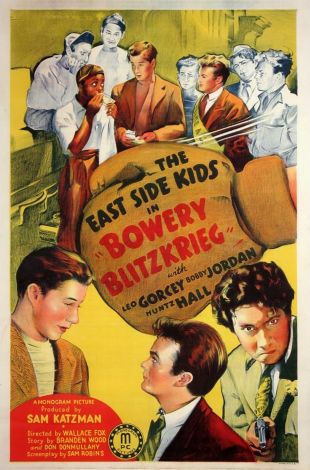
Bowery Blitzkrieg is almost more valuable as a sociological artifact than it is as a movie -- that fact might have astounded producer Sam Katzman, who thought he was delivering an hour's worth of entertainment to a couple of million viewers paying 25 or 50 cents a piece (probably for whatever the "A" feature was that this was paired with); but it makes watching Bowery Blitzkrieg our pleasure. It is entertaining, to be sure, but it's also a cut above the typical East Side Kids movie in its depth, and little touches in the writing of the characters and the nature of the plot -- all of that could be a result of the fact that it was one of a handful of East Side Kids films to be co-authored by future Oscar-winning screenwriter and producer Carl Foreman. Bowery Blitzkrieg is almost eerie in its mixing of settings, genres, and atmosphere. It takes place in a bleak urban environment, the slums of New York's Lower East Side; but it also possesses an almost wide-eyed, bushy-tailed vision of the decency of people. The tough young Irish cop on the beat (Warren Hull) has a heart of gold and a soft spot for kids on the edge of delinquency; his mother (Martha Wentworth) takes in a tough, two-fisted charity case in the guise of Muggs McGinnis (Leo Gorcey); and even the doctor who sees to Bobby Jordan's injuries is so sympathetic, and giving of his time, that he arranges to have a radio brought into his hospital room so Jordan's character can listen to the Golden Gloves fight. Couple that with the sleazy activities of the villains, who are driven by naked greed, and one gets the hint of a social message -- perhaps anti-greed, but also anti-capitalist (which would have fit in with Foreman's sensibilities from that period). One also gets an interesting image of how Americans wanted to see themselves on the eve of World War II -- Katzman was in the business of making popular entertainment and giving audiences what they wanted, and the fact that he was able to sustain the East Side Kids series across dozens of entries for five years is testimony to his ability in that area. Bobby Jordan's Danny Breslin, whose hitting the books gets him on the wrong side of his tough friend Muggs McGinnis (Leo Gorcey), is a quintessential pop-culture "type" in movies of this era -- the good kid, who, so his detractors said, is studying "so he can be president." Leo Gorcey's Muggs McGinnis is his opposite, the good kid who doesn't recognize his own decency until it's almost too late. These portrayals, put forth breezily in the hands of director Wallace W. Fox, make Bowery Blitzkrieg as much a document of their time and the sensibilities of the audience for which it was made as, say, the Dr. Christian movies at RKO or any other popular "B" pictures of their era. Sharp-eyed viewers may make note of the presence of Pat Costello, the brother of Lou Costello, as Muggs' trainer, veteran character actress Minerva Urecal as the reform school matron, and, in one of his earliest screen roles, tough-guy character actor Dick Ryan as the police lieutenant. And sharp-eared viewers may notice a very funny topical joke in the scene where Huntz Hall pedals Leo Gorcey on a bicycle and Gorcey asks why he doesn't sing "On a Bicycle Built for Two" -- "I'm not a member of ASCAP," Hall replies, a reference to the fact that the American Society of Composers, Authors, and Publishers (ASCAP) kept a tight lid on the use of songs in movies in those days.
